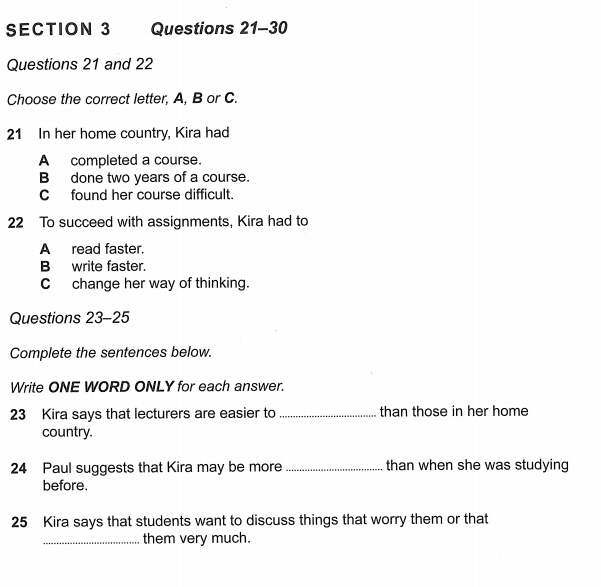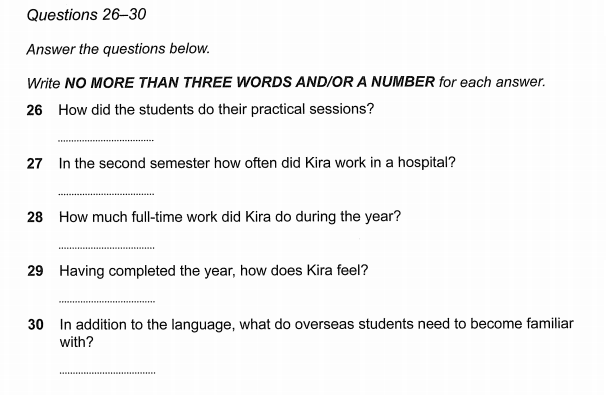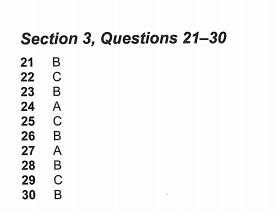剑桥雅思9Test4:雅思听力Section3解析
发布时间:2021-06-24 关键词:剑桥雅思9Test4SECTION 3
PAJL:
Hello, Kira, how are you?
RA:
Fine thanks, Paul, how are you?
PAUL:
Well, thanks. l's good to see you. It must be twelve months since you didour course?
KIRA:
That's right. lt's nice to come back and say hello,
PALL:
What course did you enrol in?
KIRA:
Actually, I went straight into third year Pharmacy. They credited me withtwo years, which probably made it more ifiult for me.
PNLL:
On the other hand, you were lucky to be granted credils. ls that why youchose the course?
KIRA:
'Yes. And, as l'd lready finishad a course in i in my country. I thought itwould be easier if I studied something I already knew.
PAUL:
I didn't reallse you went into third year. I thought you started in first
year. No wonder it was s0 hard! And what do you think is one of the bigdifferences between studying at a university here and studying in yourcountry?
KIRA:
Well, l've found it very difitlt to write assignments, because I wasn'tfamillar with that aspect of the system here. The main problem is thatthe lecturers expect you to be citical. That made me feel really terble.I thought "How can I possibly do it? How can I oomment on someone
else's research when they probably spent five years doing it?" I think a lotof people who come from overseas countries have similar problems. Butafter a while it became easier for me, People expect you to have problemswith the process of reading and writing but, in fact, it .is more a question ofaltering. your viewooint towards academic study.
PAJL:
How was the content of the lectures? Was it easy for you?
KIRA:
I didn't really have many problems understanding lectures. The contentwas very similar to what l'd studied before.
PAUL:
And what about the lecturers themselves? Are they sentialll the sameas lecturers in your country?
KIRA;
Well actually, no. Hee. theyne much easier to approach. After every
lecture you can go and ask them something you didn't understand. Or youcan make an appointment and talk to them about anything in the course.
PAUL:
Maybe you found them iferent because you're a more mature studentnow, whereas when you were studying in your country you were youngerand not s0 assertive,
KIRA:
No, I don't think that's the dfference. Most of the students here do it. Inmy faculty, they all seem to make appointments - usually to talk aboutsomething in the course that's worrying them, but sometimes just aboutsomething 1hat might really interest them, something they might want tospecialie in. The lecturers must set aside certain times every week whenthey're avalilable for students.
PAUL:
That's good to hear.
PAUL:
And how was your timetable? Was it a very busy year?
KIRA:
Very, very busy. They make you work very hard, Apart from lectures, wehad practical sessions in a lot of subjects. We _did. thess in small groups.I had to go and work four hours every week in a community pharmacy.Achally, I enjoyed this very much - meeting new people all the time. Then in second semester, we had to get experience in hospital dispensaries. S0gvery second day we went to cone of the bio hospitals and worked there.And on top of all that we had our assignments, which took me a lot oftime, Oh, I nearly forgot, between first and second semesters, we had towork. flltimne for twO weeks in a bospital.
PAUL:
That does sound a very heavy year. So are you pleased now that you didit? Do you feel some sense of achievement?
KIRA:
Yeah, ido feel much more conident. which | suppose is the most
important thing.
PAUL:
And have you got any recommendations for people who are studying fromoversess?
KRA:
Well, I suppose they need very good English. It would be much better ifthey spent more time leaming Engllsh before they enter the university,because you can be in big trouble if you don't understand what people aresaying and you haven't got time to translate.
PML:
Arnything else?
KIRA:
Well, as I said before, the biggest problem for me was日lack of fmilartywith the education system here.
PAUL:
iIt sounds as ift was a real chllnge. Congratulations, Kira.
KRA:
Thanks, Paul.


剑桥雅思9Test4:雅思听力Section3真题答案

剑桥雅思9Test4:雅思听力Section3真题答案解析
21 -22题是典型的单选题。考生需要在录音前先找出题干的定位词,并浏览完所有的选项。
23-25题属于句子填空题。注意题目的要求是ONE WORD ONLY。通过快速浏览三个句子,考生很容易凭借语法知识判断出这三个空格处分别需要填写动词原形、形容词和动词原形。此外,考生还需要快速找出三个句子的定位词。
26-30题属于经典的简答题。考生需要先划出每一道题的疑问副词或疑问代词(what)推测出答案的大致表述方式,再找出每道题的定位词去录音原文中准确捕捉答案信息。
剑桥雅思9听力答案解析:
21. A 该题难度较大,因为对话开始后便出现It must be twelve months since you did our course提示考生查看选项。在下一个提问之后,Kira说I went straight into third year Pharmacy, They credited me with two years。此信息很容易误导考生选B。再后来的I’d already finished a course in it in my country.正对应题干中的信息和选项A。
22. C 在21题后,录音中出现了大量与题干没有直接关联的干扰信息。但是只要考生跟听到题干中的assignment,并且同时注意三个选项的核心词,就可以定位该题。因为录音说I’ve found it very difficult to write assignments … ,然后又出现一段干扰信息,在定位到People expect you to have problems with the process of reading and writing … 这句话时,说明己经读到了选项,同时排除A和B,因为两个选项在并列关系出现时不能同时入选,所以排除。录音中的后面一句 ... it is more a question of altering your viewpoint towards academic study.正对应了选项C。
23. approach 考生可以通过该题中的lecturers,easier和her home country来定位录音。当男士说到And what about the lecturers themselves?时,考生就可以确定下文即将出现有关本题答案的信息。接下来女士回答说 ... they’re much easier to approach.可以确定答案。
24. mature 注意题干中的more和may be,通过句子结构可以判断出空格处应该填写一个形容词的原级,所以只要考生听到读音中的Maybe you found ... 就可以定位本题答案的信息,此外,根据“more+形容词原级”的结构,考生就可以通过音辨,听到 … you’re a more mature student …,句子中的mature即为答案。
25. interest 考生可以通过题干中的discuss和worry来定位。在听到 … that’s worrying them … 的时候,就可以定位到本题,接下来一句中 ... sometimes just about something that might really interest them ... 就包含答案。
26. (in small)groups 因为题干中疑问词是how,目标答案应该锁定为方式类的表达,所以当录音中出现practical session时就可以预测答案即将出现。接下来听到We did these in small groups ... 即可确定答案为(in small)groups。
27. every 2 days 通过题干的how often可以判断该题的目标答案应该是一个频率副词。考生通过题干中的the second semester和hospital两个定位词可以跟听录音 ... in the second semester ... get experience in hospital 然后由 ... so every second day we went to ... 来确定答案的位置。需要注意的是,every second day就是我们经常说的every two days。
Note: 此题填every second day也正确,只是与every 2 days相比,every second day比较少见。
28. 2 weeks 考生可以根据题干中的how much full-time work判断出目标答案应该是一段时间。而由录音 ... we had to work full-time for two weeks ... 即可确定答案为 2 weeks。
29. confident 由录音信息Do you feel some sense of achievement?可以快速联想到本题中的定位词feel。考生在读题前就可以通过提干中的疑问副词判断出该题的目标答案应该是一个形容词,所以当听到Yeah, I do feel much more confident.时就可以判断出形容词confident就是答案。
30. education system该题的定位词应该是language和overseas students。考生可以通过And have you got any ... who are studying from overseas?来定位本题的答案。接下来,女士表述了很多信息,一直围绕English,即题干中的language展开谈论。考生可以通过男士的提问Anything else?来判断它是in addition的替换表达,所以答案应该在后面。最后通过女生回答 ... was a lack of familiarity with the education system there.可以确定答案为education system。




